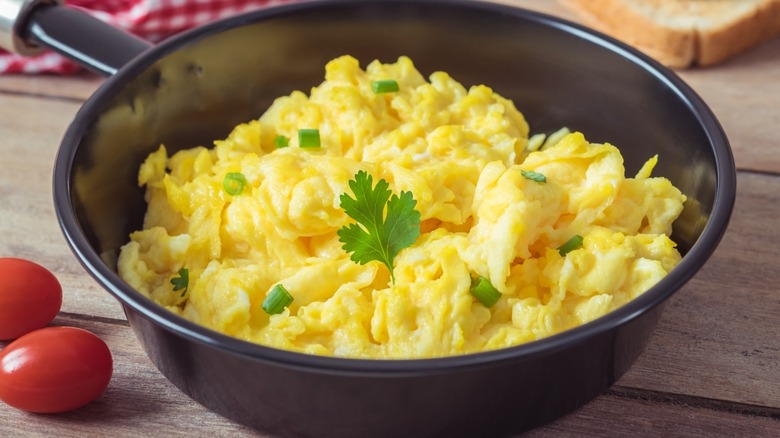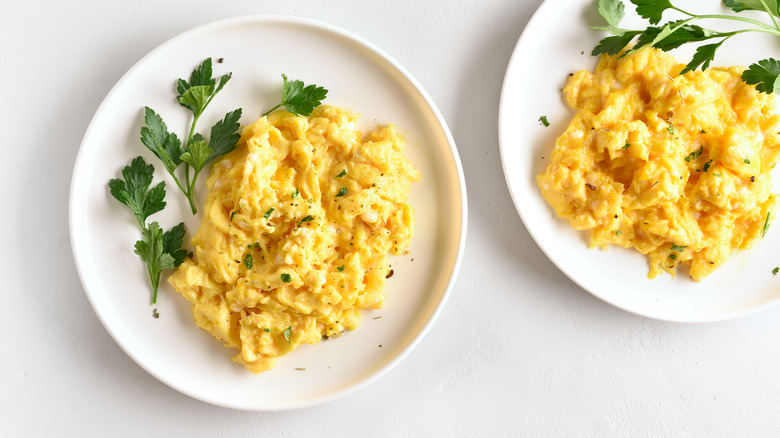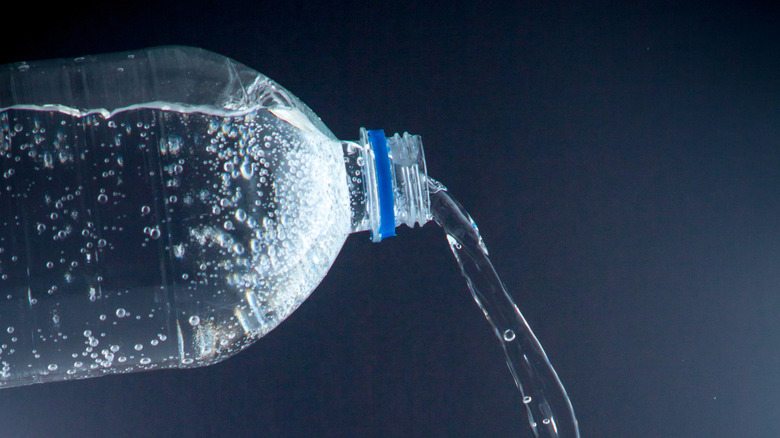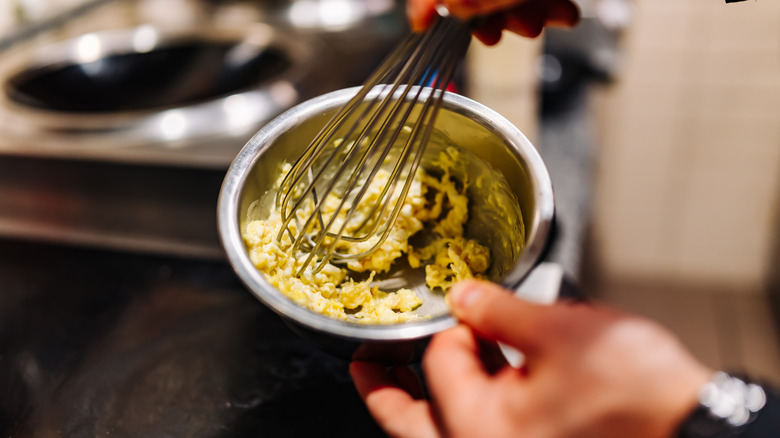Do You Add Water Or Milk To Eggs (Because It Really Does Matter)?
The quest for the perfect scrambled egg may seem neverending and full of scrambled egg hacks, from cornstarch slurries to crème fraîche to mayonnaise. All this work goes into scrambled eggs because they're a satisfying, versatile food, whether you're having a lazy morning or need something light for dinner. The state of your scramble is an entirely personal preference, which is why no one seems to agree on add-ins or methods. Most people fall into two camps — adding water or milk to your eggs — and tend to swear by one and eschew the other.
According to culinary scientist Jessica Gavin, people add liquid to their scrambles to avoid overcooking the eggs. Any added liquid prevents the proteins from binding together too much or too quickly in case you slightly overcook your eggs.
Some science touts adding water rather than milk to eggs, especially if you're looking for a fluffier scramble. According to Chef Sam Davis-Allonce and food scientist Natalie Alibrandi, when you add water to your eggs, the water evaporates as steam and lifts the eggs as they cook, making them fluffy (via Well+Good). However, adding too much water will dilute the flavor and can result in runnier eggs. Davis-Allonce suggests using ½ teaspoon of water per egg for more thoroughly cooked scrambles, and Alibrandi says 1 to 2 teaspoons of water for eggs is best if you prefer a softer scrambled egg texture.
Adding milk to scrambled eggs results in a creamier texture
In the water vs. milk debate, some swear by adding dairy products like milk or heavy cream. These people generally aren't looking for fluff; they are after a creamy scrambled egg. Adding whole milk or heavy cream enhances the texture and lends a richer mouthfeel because of the higher fat content. If you cook your eggs in butter, beware of adding too much extra fat so your eggs don't become heavy. If you prefer a creamy scramble, whole milk or half and half should fit the bill, but no more than 1 to 2 teaspoons per egg.
Even the cooking method for scrambled eggs divides people. Gordon Ramsay prepares scrambled eggs in a tall saucepan, cooks them off and on high heat, and finishes with crème fraîche, while Martha Stewart's technique goes low and slow, stirring constantly. Regardless of your cooking method or whether you added milk or water, eggs can overcook shockingly fast. If heated too long or too quickly, the egg proteins bind and set, eventually turning solid, hence why overcooked eggs are bouncy and hard.
If you're still undecided, our only recommendation is to play around with different methods and conduct your own experiments to find one that suits you, whether that involves adding milk or water to eggs or neither.
Seltzer water makes an interesting third option
As you continue your scrambled egg experiments, think about what you like to eat the most. Ultimately, the liquid you choose to add to your scrambled eggs should be determined by your taste and texture preferences. If you enjoy your eggs on the creamy side, then you should choose cream (or milk), but if you prefer scrambled eggs to be light and airy, one option is even better than plain tap water: carbonated water! Seltzer, sparkling water, whatever you want to call it, any or all of these will work. The magic, you see, is in the bubbles. These bubbles are actually tiny air pockets, so when they warm up, they'll become bigger air pockets. The more air in your eggs, the fluffier they will turn out.
For a two-egg scramble, just 1 tablespoon of seltzer will do the trick. We'd say it's probably best to opt for a plain variety rather than a fruit-flavored one, but who knows? That slight hint of lemon or blackberry might be quite tasty, so if you're feeling experimental, you might want to play around and find out for yourself.
Some say you shouldn't any liquid to scrambled eggs
When discussing the various options for adding liquids to your eggs, we'd be remiss in failing to cover the counterargument: Liquids aren't needed to make scrambled eggs. Those in the dry eggs camp insist that adding milk or water (or cream, seltzer, etc.) is one of the biggest mistakes you can make with scrambled eggs. One of the reasons for this argument claims that adding liquid tends to water down the eggs and make them less flavorful. Others claim wetter, thinner eggs will cook more quickly and become too dry. This might seem ironic, but that's kitchen science for you.
If you can't bear the thought of scrambling naked eggs, there is another non-liquid option you might want to consider: Use butter straight out of the fridge or freezer. Dice 1 tablespoon of cold butter and stir it into three beaten eggs, then scramble the mixture — without any extra liquids — for the softest, creamiest, least rubbery eggs you've ever tasted.



